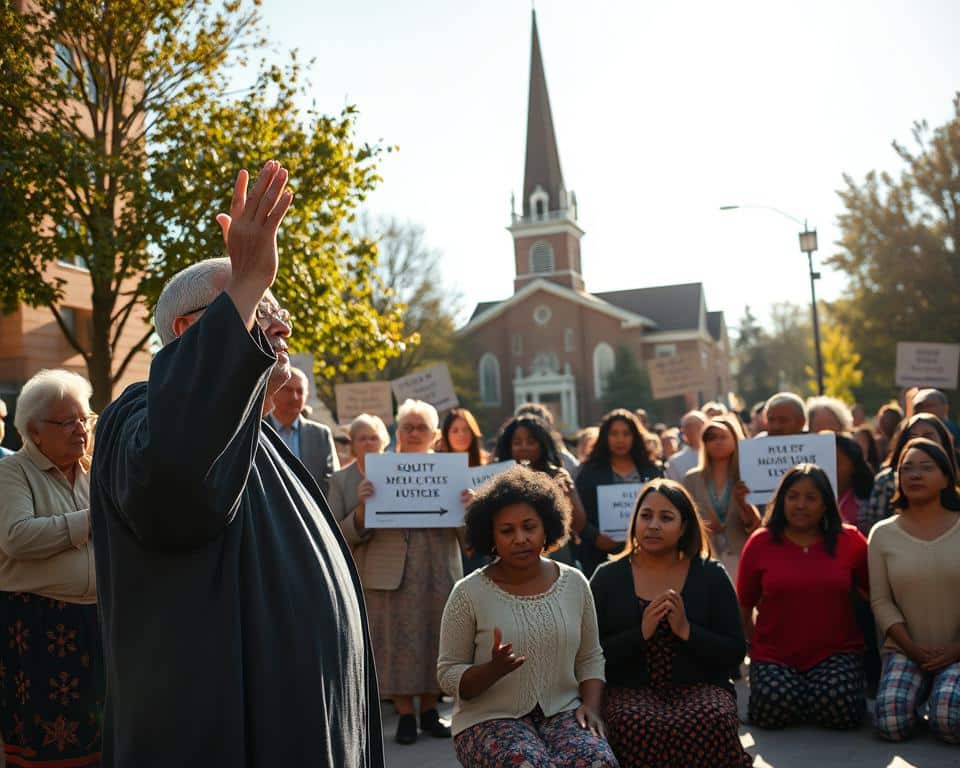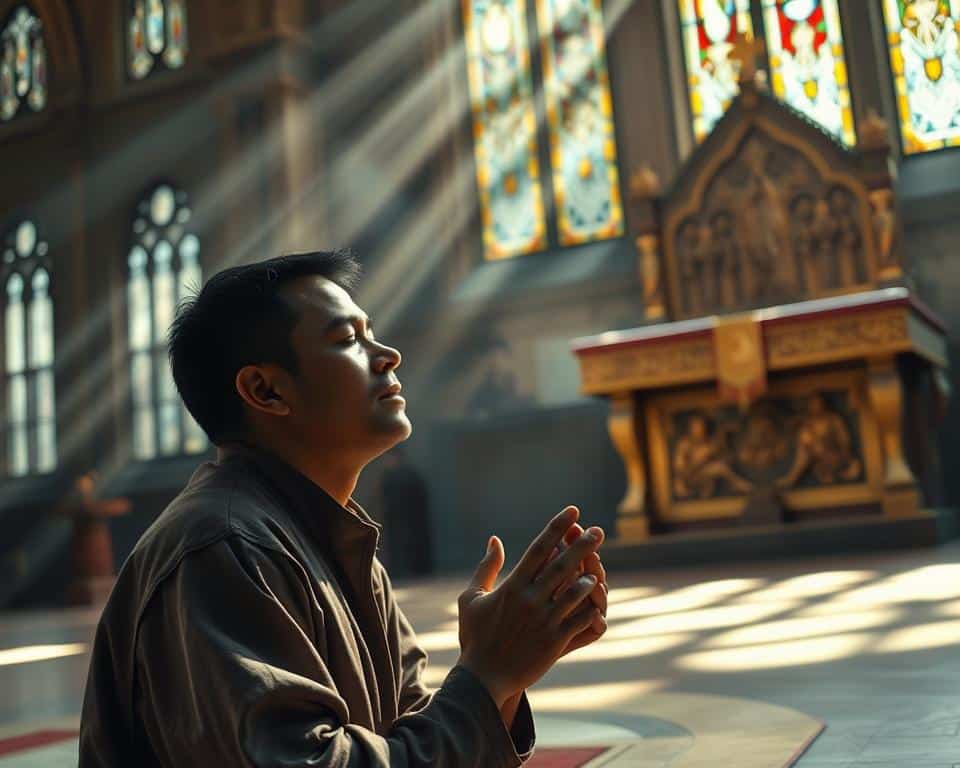“Injustice anywhere is a threat to justice everywhere.” — Martin Luther King Jr. These words remind us that faith and action must go hand in hand. For believers, standing up for justice isn’t just a choice—it’s a calling rooted in God’s word.
Faith communities have long been at the forefront of social change. From civil rights to climate justice, they bring hope and compassion to pressing issues. Scripture guides this work, urging us to love our neighbors and seek fairness for all.
Today, groups like the Sustainability Directory show how faith-driven efforts can amplify impact. By sharing knowledge and resources, they empower others to act. Leaders like Alvaro Ramazzini prove that biblical teachings inspire real-world change.
This is more than activism—it’s living out faith with purpose. Together, we can build a world that reflects God’s justice and love.
What Is Faith-Driven Advocacy?
Biblical values inspire believers to act, not just speak, for justice. It’s about turning faith into tangible efforts—feeding the hungry, defending rights, and lifting up the marginalized. As Jesus taught in Matthew 25, true faith serves “the least of these.”

Defining Faith-Based Action
Faith-based advocacy isn’t partisan politics. It’s practical work grounded in God’s word. For example, the Baptist Joint Committee (BJC) guides churches on tax laws, showing how to advocate without endorsing candidates.
Dr. King modeled this. He refused to align with parties but boldly confronted racial and economic injustice.
“The church must be the conscience of the state, not its tool,”
he declared.
How Faith Guides Advocacy Efforts
Scripture shapes priorities. Churches address climate change or poverty because they reflect God’s care for creation and people. Shared beliefs unite communities to act, not debate.
This work stays focused on values, not power. Like Dr. King, faith-based advocates challenge systems while pointing to a higher moral standard.
Principles of Faith-Driven Advocacy
Compassion isn’t just a feeling—it’s a call to action rooted in faith. When we advocate for justice, we follow God’s command to love others as ourselves. These efforts are built on timeless principles: hope, truth, and a commitment to serve.

Compassion and Hope as Foundations
The Bible urges believers to “speak up for those who cannot speak for themselves” (Proverbs 31:8-9). This isn’t optional—it’s a responsibility. Real compassion means feeding the hungry, sheltering refugees, and defending the oppressed.
Hope fuels this work. Dr. King once said,
“The arc of the moral universe is long, but it bends toward justice.”
Faith reminds us that change is possible, even when progress feels slow.
The Role of Scripture in Advocacy
Isaiah 1:17 commands us to “learn to do right; seek justice.” This verse inspires modern efforts, like protecting Indigenous lands from mining. Bishop Alvaro Ramazzini used Guatemala’s laws to defend communities, showing how Scripture guides practical action.
Churches today apply these teachings to climate justice, poverty, and voter rights. The Baptist Joint Committee trains faith groups to advocate within legal boundaries, ensuring their work stays focused on biblical values.
Balancing Faith and Public Policy
IRS rules allow 501(c)(3) nonprofits to lobby for issues—just not candidates. Churches can champion fair wages or environmental care without endorsing politicians. The key is staying true to Scripture, not partisan agendas.
Public policy becomes a tool for justice when faith shapes its use. Like Dr. King, we’re called to challenge systems while pointing to God’s higher standard of love.
Examples of Faith-Driven Advocacy in Action
History shows how faith inspires real change when put into action. From legislative halls to mining towns, believers have turned Scripture into solutions. Here are three powerful examples.
Martin Luther King Jr. and Civil Rights
Martin Luther King Jr. championed racial equality without political endorsements. He pushed for laws like the Civil Rights Act, rooted in Isaiah 1:17’s call to “seek justice.”
His sermons framed justice as a moral duty, not partisan debate. “Injustice anywhere is a threat to justice everywhere,” he declared, uniting faith and action.
Alvaro Ramazzini’s Environmental Justice Work
For 20 years, Bishop Ramazzini resisted gold mining cartels in Guatemala. He cited Psalm 24:1—“The earth is the Lord’s”—to protect Indigenous lands from pollution. His lawsuits set legal precedents for environmental justice.
Modern Faith Communities Addressing Climate Change
Today, 80% of the global population identifies with a religion. Groups like Germany’s BMZ partner with churches to advance UN Sustainable Development Goals. Projects include:
- Renewable energy initiatives led by Lutheran congregations
- PaRD’s interfaith work on climate and gender equality
Their collective impact spans 40+ countries, proving faith communities drive tangible change.
Legal Boundaries for Faith-Based Advocacy
Navigating tax laws ensures churches can champion justice without risking their nonprofit status. The IRS allows faith groups to advocate for issues like poverty or climate care—but draws a hard line at partisan endorsements. Staying compliant keeps the focus on biblical values, not political power.
Tax Rules and Political Endorsements
501(c)(3) nonprofits lose tax-exempt status if they endorse candidates. However, they can:
- Host nonpartisan voter forums
- Preach on issues like immigration or healthcare
- Lobby for laws aligned with Scripture
Dr. King warned,
“The church must never be the state’s tool.”
Today, the Baptist Joint Committee (BJC) helps churches advocate within these bounds.
Separation of Church and State
The First Amendment protects faith groups from government interference—and vice versa. Recent Supreme Court rulings, like Kennedy v. Bremerton, have shifted interpretations. Yet the core principle remains: Churches influence policy through moral witness, not partisan ties.
Advocating Without Violating Laws
The BJC’s checklist for lawful advocacy includes:
- Focus sermons on justice issues, not candidates
- Use 20% or less of budgets for lobbying
- Partner with secular groups on shared goals
Proverbs 31:8–9 reminds us to “defend the rights of the poor.” By following IRS guidelines, faith communities can answer this call without compromising their mission.
Challenges Facing Faith-Driven Advocacy Today
Standing up for justice today comes with unique hurdles for faith-based efforts. Over 40% of countries restrict religious freedom, and leaders like Bishop Ramazzini face ongoing threats for defending Guatemala’s Indigenous communities. Yet Scripture urges us to persevere: “Defend the rights of the poor and needy” (Proverbs 31:9).
Christian Nationalism vs. Biblical Advocacy
Christian nationalism conflates political power with faith, unlike biblical advocacy focused on justice. Groups like Christians Against Christian Nationalism reject this ideology, emphasizing Jesus’ call to serve marginalized communities.
True faith-driven work prioritizes people over partisanship. As Dr. King warned, mixing faith with state power risks corrupting both.
Protecting Religious Leaders Who Speak Out
One in three faith-based advocates faces government surveillance. Bishop Ramazzini’s lawsuits against mining cartels show the cost of courage. Germany’s PaRD initiative offers support, partnering with persecuted leaders worldwide.
Global Threats to Faith-Based Advocates
“Shrinking spaces” for advocacy are evident in conflict zones like Myanmar and Sudan. Attacks on churches and activists have surged, yet hope remains. Partnerships between groups like the UN and faith communities prove collective action can overcome oppression.
Despite these challenges, God’s command to “seek justice” (Isaiah 1:17) endures—and so must we.
How You Can Practice Faith-Driven Advocacy
Your faith can fuel real-world change when paired with action. Start by joining efforts like PaRD’s climate justice task forces. They unite faith groups to tackle pressing issues.
Use free resources, like the Baptist Joint Committee’s advocacy toolkits. These guides help churches lobby legally for justice—from mining reforms to voter rights.
Partner locally. Groups like Bread for the World connect interfaith chapters to fight hunger. Or follow Bishop Ramazzini’s model: Use laws to defend vulnerable communities.
Your voice has power. Urge legislators to protect religious freedom with prewritten scripts from the BJC. Together, we can live out Proverbs 31:8–9: “Speak up for those who cannot speak.”





